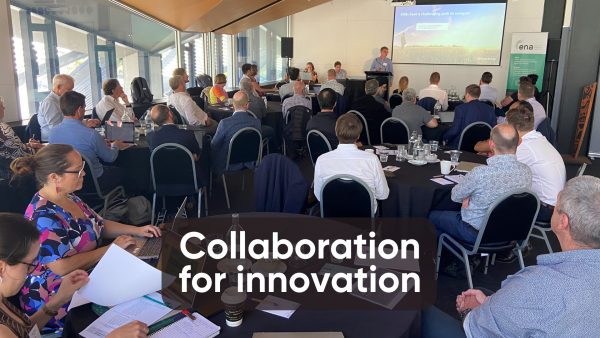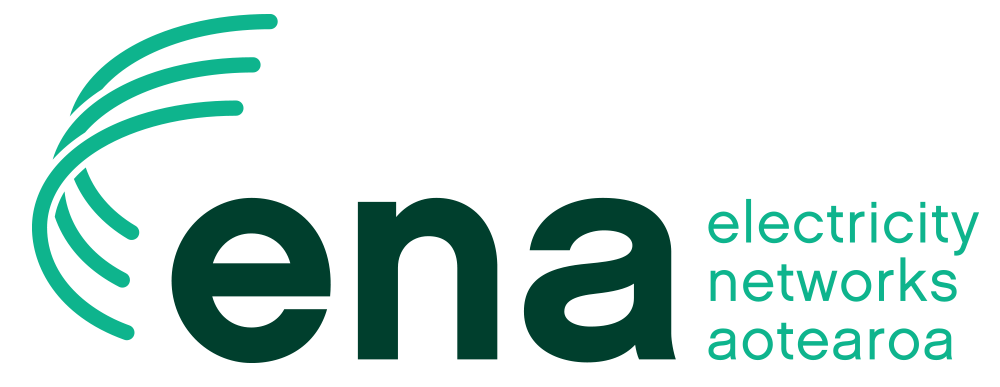Future Networks Forum
The purpose of the Future Networks Forum (FNF) is to harness the collective power of the distribution sector to help Aotearoa reach its climate change goals.
The FNF identifies opportunities where Electricity Distribution Businesses (EDBs) can align to help Aotearoa reach our climate change goals and create value for customers. Below is a short summary of the initiatives that are currently being worked on.
The FNF is co-chaired by Sam Elder from Orion and James Tipping from Vector and the group is made up of representatives from across 25 lines companies.
New EDB members are encouraged to join the Future Networks Forum so we can form a comprehensive view of opinions from across all our lines companies. If you are from an EDB, and you want to find out more, please email us at FNF@electricity.org.nz.
ENA members can login to the full FNF pages here.
If you’d like to hear more about the FNF – or a particular project – email FNF@electricity.org.nz.
Innovation forums
The FNF run three innovation forums per year. These are two day forums to engage with the sector and have valuable kōrero about each of the projects and their progress. These are generally held in Wellington (with an online option).
All ENA members are welcome to attend. Our next forum is pencilled in 13-14 November. More details including agendas and RSVP forms will be available soon.

A photo from our second innovation forum in March 2024
Current FNF initiatives
Aligning EDB capability, roles and functions to enable distributed flexibility
The adoption of consumer and distributed energy resources (e.g. solar panels and battery systems) is driving changes in the way EDBs plan and operate their networks, and new products and services in the retail market. EDBs will need to build new capability and undertake new functions and roles to support the use of these resources in a smart and flexible way.
To help with this, the FNF is working on a project to improve understanding and alignment between EDBs on the capability, roles, functions and industry architecture to enable distributed flexibility. This will help to deliver maximum value to Aotearoa’s electricity consumers.
The first stage is defining the roles, functions and common terminology. To inform this, the project has undertaken international research on emerging practices and is engaging with EDBs to capture a pan-EDB view. The next steps will be collaborating and testing with the wider sector to seek input and alignment on capability, roles and functions and ensure we produce outputs that add real value to the whole sector. A second stage will consider industry architecture and relationships to fulfil these roles and functions, and the impact of these on EDBs.
We highlighted this work in our submission to the Electricity Authority on the Future System Operator, and have encouraged the Authority to consider this work as they evolve their thinking.
Customer segmentation
This project will help to underpin all wider FNF projects. It’s building a shared understanding and common language amongst EDBs about who our customers are (both connected consumers and non-consumer customers), their current and future needs, and the pain points in their customer journeys – which EDBs may be well-placed to address. This is a core foundational piece, and will ensure a customer-centric approach to FNF’s ongoing prioritisation and work programme.
Connections journey mapping
The need for high-speed public EV charging stations, together with the growth of applications to connect distributed generation, is one of the reasons that this project is so important. The FNF ‘Connections Journey Mapping’ project is about aligning EDBs’ processes to improve the connections journey for customers.
The project members are working closely with the Electricity Engineers’ Association and the Electricity Authority (who are also doing work in this space) to ensure that the projects align nicely so we can create real improvements in the customer connections journey.
The team meets with representatives of charge point operators, large distributed generation customers and EDBs to fully understand their pain points and discuss potential solutions. It has come up with a long-list of 13 action points to improve the customer journey, from pre-application right through to delivery. The plan is to deliver the ‘quick win’ solutions first, and develop a delivery plan for the longer-term deliverables.

Flexibility opportunities project
This initiative is exploring commercial mechanisms and enhancing an initial evaluation calculator for flexibility projects, developed by Wellington Electricity and Orion through their Resi-Flex project. The FNF project is identifying potential additional commercial mechanisms and developing a standardised assessment framework for EDBs to compare traditional (infrastructure) network solutions with non-network flexibility solutions.
Development of aligned solutions
There are three initiatives underway in this project:
- develop consistent approaches to sharing DER information between EDBs and other parties
- explore the evolving role and use of HWC load control by EDBs and investigate DER data exchange needs between EDB↔SO
- investigate how EDBs enable optimised EV charging by consumers and other parties.
They have done a survey of existing and future practices by New Zealand EDBs, and will then do an international survey and interviews to inform next steps and quick wins.


